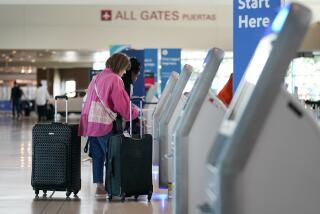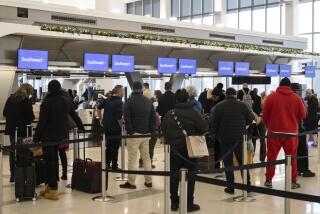New Limits on Airline Ownership Proposed
- Share via
WASHINGTON — The Bush administration wants to ease restrictions on overseas investment in U.S. airlines, a move that could give struggling carriers a route for fresh capital and break the logjam in transatlantic aviation talks, the Transportation Department said Wednesday.
The agency said it was proposing a rule that would ease the tightly scrutinized regulation barring overseas investors from exercising control of domestic carrier operations in certain circumstances.
The proposed rule would allow international investors more input in marketing, routing and fleet structure. The change would apply only to countries that have aviation treaties or open-skies agreements with the United States.
“No strategic investor is going to come in if he’s required to remain in a passive position. The only way someone will come in is if there’s an opportunity to protect it,” said Jeffrey Shane, Transportation Department undersecretary for policy.
“We think that by facilitating more participation by non-U.S. citizens, we enhance the flow of capital to U.S. airlines,” Shane said.
The administration is not proposing any change to the strict law that caps international investment at 49% but 25% of voting stock.
U.S. airlines could lose as much as $10 billion this year, according to industry estimates. Three major carriers are in bankruptcy protection.
Congress has prevented changes in ownership regulations, with many lawmakers arguing that control of the airlines is a unique component of the American business identity and necessary to ensure national security especially after the Sept. 11, 2001, attacks.
Labor groups and their political allies also have fought to prevent changes that they say could undermine their jobs.
“We’ve seen dozens of industries from steel to autos to textiles go over the side as a result of globalization or allowing foreign entities to take them over,” said Edward Wytkind, president of the AFL-CIO’s transportation trades unit.
Shane said the proposed change, which is subject to a 60-day comment period before the department will consider final approval, would ensure job protections.
Aviation consultants said removing the limits on control might satisfy European negotiators at revived talks on liberalizing transatlantic aviation.
Previous talks foundered partly on European demands for greater access to U.S. destinations.
More to Read
Inside the business of entertainment
The Wide Shot brings you news, analysis and insights on everything from streaming wars to production — and what it all means for the future.
You may occasionally receive promotional content from the Los Angeles Times.










